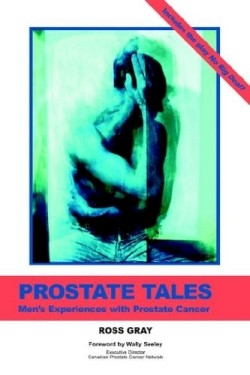
Prostate Tales
Men's Experiences With Prostate Cancer
A diagnosis of prostate cancer occurs within a haze of medical uncertainty that is probably unparalleled in addressing other types of cancer. While the disease remains localized, physicians (or their patients) may choose one of three primary approaches: radical prostatectomy, radiation therapy, or “watchful waiting,” but there is wide disagreement regarding their relative merits. Decision-making is complicated further by the various side effects of treatment, among them impotence and incontinence, and in the case of watchful waiting, the risk of unexpectedly rapid growth of cancer cells.
Statistics show that until recently prostate cancer struck mostly men in their late 60s or 70s, and many of these men simply lived out their lives, eventually dying with prostate cancer but not of it. Now, because of the PSA test, which allows earlier detection of prostate cancer (in younger men).
Younger men, however, cannot reasonably choose to ignore it; they must make agonizingly difficult decisions regarding treatment, and later, should impotence or incontinence occur, they experience even greater difficulty in dealing with it.
Gray, who has worked extensively with victims of prostate cancer, knows about the emotional suffering that many men experience, even those who’s treatment is medically successful. He draws upon hundreds of interviews and participation in support groups for the material that went into the writing of Prostate Tales, a collection of brief dramatizations depicting men in various stages of coping with their fear or with the side effects of surgery and other procedures.
Among the problems with which Ben grapples is the embarrassment experienced by many men with prostate cancer: “I’m not sure I want to be wandering around with everybody knowing I’m a eunuch.” Maurice is fearful of losing his sex drive, a prospect that is “almost as scary as the thought of the cancer coming back.” Carl fears death itself: “It’s embarrassing, this unexpected weakness, this desire of an old man to live forever.” Larry tries to reassure Ben: “Isn’t it better to be alive, even if you pee yourself or you only have five percent of your erection?” John is recuperating after surgery, and he is “pretty much OK” except that he “can’t drink beer and play golf at the same time.” Fred confesses that “…there are moments that I can hardly stand it, the fact that we can’t make love the way we used to.”
One by one Gray’s tales reveal the distinctiveness and the similarities of each man’s struggle. In a society in which even a physician is sometimes heard to speak evasively of the genital and rectal areas as “down there,” Prostate Tales makes a strong case for plain talk. (Janaury)
Reviewed by
Harold Cordry
Disclosure: This article is not an endorsement, but a review. The publisher of this book provided free copies of the book to have their book reviewed by a professional reviewer. No fee was paid by the publisher for this review. Foreword Reviews only recommends books that we love. Foreword Magazine, Inc. is disclosing this in accordance with the Federal Trade Commission’s 16 CFR, Part 255.
